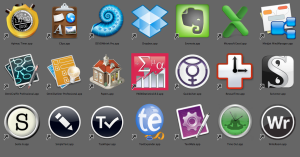I’m currently spending some time getting myself organized and ‘set up’ to write my dissertation – the process, my time, my stuff, my articles, etc etc etc…
I must confess that I felt guilty about compulsively doing this and little else, until a generally prudent friend assured me that I’m not OCD and that this is an important step in the dissertation process and a valid use of my time.
So I’m giving myself three days to get organized and all set up. What does that involve?
Making decisions about where stuff goes and where stuff happens.
By “stuff” I mean scraps of paper, tasks, project flowcharts, random ideas, daily freewrites, lists of my decisions and finalized plans, etc.
By “where” I mean programs on the computer and physical collection points, which I want to minimize unless it’s useful to have it in physical format.
Inboxes
I’m playing with a lot of collection points right now (a calendar, post-it lists of tasks, my email inbox, my voicemail inbox, my SMS inbox, a voice recorder, a paper notebook, and random odds and ends like mail, physical reminders of tasks such as parking tickets, etc.) but I want to reduce the size of that list, or at least take a mental inventory of it so that I don’t forget to process all of these inboxes.
Software for Capture of Notes
For capture I’m considering Evernote (great for in-context tasks, ubiquitous capture including voicenotes and photos via iphone, but you can’t really export your stuff and you have to pay!), Devonthink (amazing and time-tested, but it misses Evernote’s ubiquitous capture and doesn’t have a task feature that I can see… not sure if it should however), and Scrivener (which is too project-specific to be my inbox), and Circus Ponies Notebook (which I love because of the in-context notes, auto indexing, handwriting recognition, ability to draw with a tablet and pen, ability put notes anywhere next to each other, etc…. but which is not as seamlessly integrated into the rest of my workflow as the others could be – might just be too much software for me).
Decisions
My goal is to limit the number of contact points. Here’s my planned workflow, after testing each: I think i’ll use evernote as my inbox and capture things on the run, but I will not use it as a storage system. Just like email, whatever goes into the inbox must come out and go to the appropriate place. Devonthink is where I’ll put my text tidbits from writing. Scrivener is where I’ll compile all the good stuff and turn it into a manuscript, and Word is where I’ll do the final draft. I’ll keep my articles in Papers (and maybe also in Devonthink?) and export the bibliographic info from Papers to Word to do the bibliography.
Needs
I still need a long-term project planning process (though I’m reading The Clockwork Muse which may help), nor do I have a good tickler system (a simple email sent to myself in the future would probably be best). Any ideas on that would be great!









